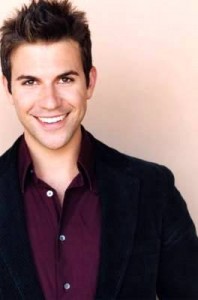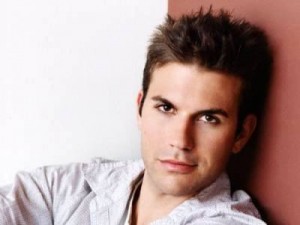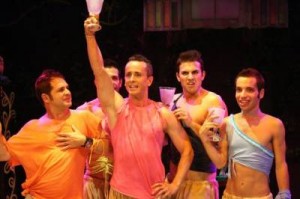In the Hollywood world of young actors more interested in getting representation than perfecting their craft, it’s refreshing to meet someone like Aaron Lee Misakian. Combining leading man good looks with a flair for comedy, and serious training in the classics, Aaron is following his winning performance as gym bunny “Cal Nike” in the Celebration’s Sissystrata with a featured role in Actors Co-op’s production of Ken Ludwig’s Leading Ladies. No, Aaron is not playing one of the cross-dressing titular characters but rather the earnest Butch, fiancé of Audrey, Leading Lady’s actual leading lady. We were lucky enough to get Aaron to sit down sometime between rehearsals for Leading Ladies and performances in Sissystrata and answer our questions. Here’s what Aaron had to say about going from Sissy to Butch, and other topics of interest.
When did you first decide that you wanted to be an actor?
It was when I got to college. I originally started out as a molecular biology major, but one day saw an ad for a play that was being done at one of the campus theatres. On a whim, I auditioned and ended up with a lead role. I fell in love with it at first sight. During that time, I was working in a genetics laboratory invested in the development of stronger chemotherapy drugs and then performing at night. My heart sailed for the latter – I couldn’t stand being held up in a little box doing research. So I literally changed my major that next semester and my life completely changed thereafter.
That’s quite a career change. I’m surprised the acting bug didn’t bite you while you were growing up in Fresno.
No, I had never acted or done any plays until I got to college.
You graduated with honors from New York University, Tisch School of the Arts. What was it like for a Central California boy to go off and study drama in the Big Apple?
It was a huge shock moving from Fresno to New York. I had never been around so many people, and so many people with different styles of clothing! My first semester I had a little bit of a meltdown. It was just so overwhelming, and even in that big city, I felt completely alone. Slowly but surely, though, as I started acting I made some incredible friends and began to open up to a new way of living that honestly wasn’t allowed in the hometown I came from.
What’s your best memory from your time at NYU?
I would say my fondest memory from NYU was when I fell in love for the first time. It was actually the day I graduated, and as a gift I was given front row seats to a well-known Broadway musical. I kinda fell head over heels for one of the leads in the show. For some silly reason, I went backstage afterwards and introduced myself. We hit it off big time. It was like fireworks. We stayed out all night, laughing and getting to know one another. The next day, I cancelled my plane ticket back to LA and stayed for the duration of the summer in New York.
You’ve done a lot more Shakespeare than most actors your age. What draws a young actor in the 21st Century to the Bard?
You know, honestly, I did so much Shakespeare because so many older actors told me I’m just classical in nature. I don’t really know what that means. Maybe they’re calling me old – who knows. But I listened to their advice and did as many Shakespeare plays as I possibly could. I love it, though, because it’s so rare that the body, voice, intellect, and heart are instantaneously married in a moment, and that’s what happens when I do Shakespeare. It’s thus just some of the best training in the world for an actor – you shape your body, you strengthen your voice, you sharpen your intellect, and you get to express your heart.
What’s your favorite Shakespeare role so far?
My favorite thus far is Flute/Thisbe at the Old Globe, directed by Dark Trejsnak.
What Shakespearean role would you most like to undertake?
The role I’m dying to play is Prince Hal from Henry IV, mainly because of the dad issues. It contains some of the richest Shakespearean dialogue for a young actor, and really expresses my own personal opinions of sometimes feeling like the underdog in a celebrity-dominated place like Los Angeles.
How does performing Shakespeare compare with doing a contemporary plays like say Angels In America or The Fifth Of July?
Shakespeare is different that contemporary pieces like Angels because it’s like I said before – the classical text is a marriage of the body, voice, intellect, and heart. Usually, with contemporary text, you focus more on only one or two of these aspects simultaneously. Especially in an art form like film, it’s often more engaging what is not being said.
You spent the past couple years back in San Diego getting your MFA in Acting from the Old Globe Theatre/University of San Diego? What prompted that decision?
I had been offered a series regular position on an NBC show but the week before I’d applied to grad school. I mainly applied to prove I could get in. Weird, I know, but it always seemed like the best actors (like Meryl) went to a top-notch grad school. So I wanted to be like them! My show on NBC got cancelled, and literally the next week I found out I was accepted into the Globe and some other programs. I felt like it was a sign, so I took it.
You’re just coming off of a run in Sissystrata, a gay version of Euripides’ Lysistrata, which I absolutely loved. What was it like for a classical actor like yourself to do such an outrageous take-off on a Greek classic?
Sissystrata was similar to a lot of bigger choral work I’ve done, like John Rando’s Restoration Comedy. It’s more external and “big,” you could say, but it’s still all from the same place – the heart. So I didn’t mind doing the show, and I did it to help me with broad physical comedy. It especially helps with sitcom auditions.
What do you hope that audiences took away from Sissystrata?
I hope audiences just laughed in the show. It’s simple, but think about how good it feels to laugh. I know I’ve done my job when a room full of people really have a good laugh.
You’re now about to costar in Leading Ladies, one of Ken Ludwig’s wildest and funniest plays. Can you tell us something about your character Butch?
Hmm, Butch is about discovery. Everything is brand new: the way his girlfriend looks in roller skates, how the paper his dad is reading contains insightful facts about a world that is on the verge of revolution, how English girls smell different than American women, and the list goes on. He also operates from the heart. Again, one of my favorite words.
Already in 2008, you’ve been directed by two of L.A.’s most creative directors, Michael Matthews for Sissystrata and Richard Israel for Leading Ladies. What is it like to work with these masterful directors as compared to any more run-of-the-mill directors you might have worked with in the past?
Honestly, they’re more pleasant. I actually don’t mind coming to rehearsal. You can have a brilliant director in hand, but if they’re not willing to stop, listen, and work with you, what’s the point? I believe the most powerful person in this industry is the actor. It’s important, then, for people to listen to what we have to say, and Richard and Michael have always been open to my opinions and ideas. At the same time, I do like to be led and need direction, and both of these men have been able to help me in the shaping of character evolution.
How does the L.A. theater scene compare with those in New York and San Diego?
The theatre scene in LA is different because not as many people come unless it’s the Taper or South Coast Rep. And when you’re working at those venues, it’s great, but people need to know about the OTHER great stuff! I also find that the actors in New and San Diego were just more committed to the craft, while so many people here only want to use plays to get an agent. Plays should be a vehicle for change – how to grow and evolve as both an actor and a person.
What are some of the more positive aspects of doing theater in Los Angeles?
What I love about LA actors and theatre is it comes more from the soul. So many stage actors get caught in the technique and the way and bla bla bla. Rather, it’s about the human heart of the matter! That is what’s going to stick with people by the end of the night, not how well you hit your t’s or d’s. Film actors are just more in touch with this – the good ones let you see their soul. So working with actors like that is a joy, and I get that mainly from peeps in Los Angeles.
Now that you’re an L.A. based actor again, is it your plan to do more film and TV work?
Yes, I came to LA for a reason – film and TV. That’s my passion. I do stage work to grow and stretch as an actor, but after my NY and LA showcases, it was evident that I saw my career blossoming in front of the camera.
Where would you like to see yourself career-wise 5 years from now?
In five years, I’d love to be making gritty, independent films with roles that come from the heart. Examples of this would be The Hours, Brokeback Mountain, Lars and the Real Girl, etc. TV guest appearances would be nice, but I hope not to get caught in a contract that would limit my range. The stage work will always continue, and my dream would be to contract with theatres like the Guthrie and the Public during down time and summers.
It’s great to see Hollywood based actors who continue to enjoy, and grow, from live stage work. I’m looking forward to seeing your transition from Sissy to Butch in Leading Ladies!





 Since 2007, Steven Stanley's StageSceneLA.com has spotlighted the best in Southern California theater via reviews, interviews, and its annual StageSceneLA Scenies.
Since 2007, Steven Stanley's StageSceneLA.com has spotlighted the best in Southern California theater via reviews, interviews, and its annual StageSceneLA Scenies.







 COPYRIGHT 2025 STEVEN STANLEY :: DESIGN BY
COPYRIGHT 2025 STEVEN STANLEY :: DESIGN BY